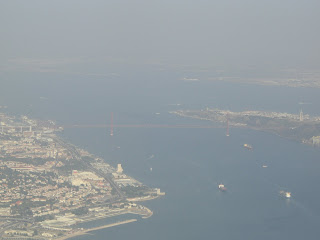English first/日本語は後
1. People: The majority on Japanese beaches are definitely those in 20's plus just families. You hardly see senior people. Moms in general stay in a T shirt under a parasol and thus don't show their body line, while dads still do not care about showing off their beer-barrel-like belly to take care of their kids. The key idea is that the beach is a place like a fashion show, and so people don't want to show their ugly body lines as they get aged. The same philosophy might be applied to US, in particular Californian beaches, yet many people want to go to beach. That's the reason why they attend 24Hrs Fitness really hard to keep their proportion against their age. The difference from Japan which I noticed was that senior people in US seem like enjoying a walk on beach much more frequently. Now, you can imagine what I would like to say about Portuguese beaches. Yes, I saw many sea lions loafing on the beach. Of course, they are actually not sea lions but people having a large amount of excess flesh (the definition from the MacNote dictionary.) I was just surprised to know that such big swimming suits, particularly bikinis are available to purchase in Portugal. Why don't they care about showing their chucks to the public?
The other day on a bus, a senior lady helped me transfer from a bus to a train. Although I didn't understand 99% of what she said, she kept talking to me in Portuguese. When the bus passed by a beach sign, ("praia" in Portuguese), she wanted to tell me that there is a beach in that direction, using her gesture of waving and wading with her hands. She seemed really happy. Now, I got a hint to my question! Beaches to Portuguese are just like hot springs to Japanese. Regardless of age, sex, and of course body shapes, everyone would like to enjoy getting relaxed on the beach as Japanese want to soak themselves in a hot spring.
2. Building: Restaurants and service facilities on the beach in Portugal seem permanent like US, whereas Japan only allows those facility to be temporarily built every high season, (i.e., July and August). Houses nearby the beach in Portugal do not seem well-maintained unlike US and Japan. I thought the closer to the beach the more expensive and better maintained houses would be, because people always look for an ocean view and a water-front life. However, as you can see my pictures, those houses in the Telha beach, 10+ miles south from Lisbon could even seem like a refugee camp. Miguel told me that they were all illegally built without purchasing and thus owning a land. Good houses are built back a little far from the beach, actually behind a pine-tree barrier to prevent beach sand from shifting to them.
1人:日本のビーチで大半を占めるのは、20代と家族連れでしょう。年配の人達は滅多に見かけません。家族連れのお父さんは、子供と一緒に遊んでビール腹を見せることが多いでしょうが、お母さんは、大体Tシャツを着てバラソルの下に留まって、裸になって体型を見せる事はありません。根本にある考えは、ビーチというところはファッションショーに似ているから、歳を取って醜くなった体を見せに行きたくないということだと思います。同じような原理は、米国、特にカリフォルニアのビーチにも当てはまるかもしれませんが、それでも、ビーチに行きたい人は多いです。だから、歳に反して体型を保つために、24時間フィットネスに懸命に通う訳です。しかし、日本との違いは、米国の方が、海辺の散歩を楽しむ年配の人がかなり多いということだと思います。さて、ここまで来ると、ポルトガルのビーチ事情をどう私が考えているか見通しが付くかもしれません。そうです、ポルトガルのビーチには、トドが怒濤の如くころがっているのです。もちろん、その生き物は、トドではなくて人間なんですが、(マックノートの辞書から引用すると)異常に脂肪を蓄えた方々なんです。驚いたのは、こんな巨大な水着というか、ビキニがポルトガルで手に入るということです。そして、公衆の面前で、その肉体を見せる事に気にもかけないのは何故?
ある日、バスでお婆さんが、私が電車に乗り換えるのを面倒みてくれました。彼女の喋っていることの99%は理解できないのに、ポルトガル語で私にガンガン話しかけます。バスが海岸と書いてある看板(ポルトガル語でプライアと言う)を通り過ぎると、お婆さんは手を使って波やチャプチャプ水遊びをする仕草をしながら、私にこの方向にビーチがあると教えてくれました。彼女がとても幸せそうに見えるのです。それを見て、私の疑問を解く鍵を見つけました。ポルトガル人にとってのビーチというのは、日本人にとっての温泉のようなものなのでしょう。歳、性別、そして、体型に関係なく、日本人が温泉につかりたいたいように、ポルトガル人は誰しもビーチでゆっくりしたのです。
2建物:ポルトガルのビーチにおけるレストランやサービス施設は、米国と同様にずっと建てられいるようです。日本は(7月8月)のシーズン中にしか一時的に建てられる訳ですが。ポルトガルのビーチ近辺にある建物を見ると、米国や日本のように綺麗に維持されていません。皆、海の景色や水辺での生活を求めるのが常なので、海岸に近い程、立派な家が多いだろうと思うのですが。写真をみると分かるようにリスボンから16kmちょっと南にあるテリヤ海岸の軒並みは、どれもこれも難民キャンプのようにすら見るのです。ミゲールが言うには、これらの家は皆違法に建てられたもので、そもそもその土地すら買ってもいないし所有してもいないのだそうです。立派な邸宅は海岸からちょっと奥まったところ、実際には松の防砂林を超えた所に建てられているのです。
Photo 1: Anyone welcome to beach (ビーチは誰もが行きたい)

Photo 2: Permanent beach house(永久的に建てられた海の家)

Photo 3: Telha Beach (テリヤ海岸)

Photo 4: Ocean-front houses with low quality (質の悪い海辺の民家)




























